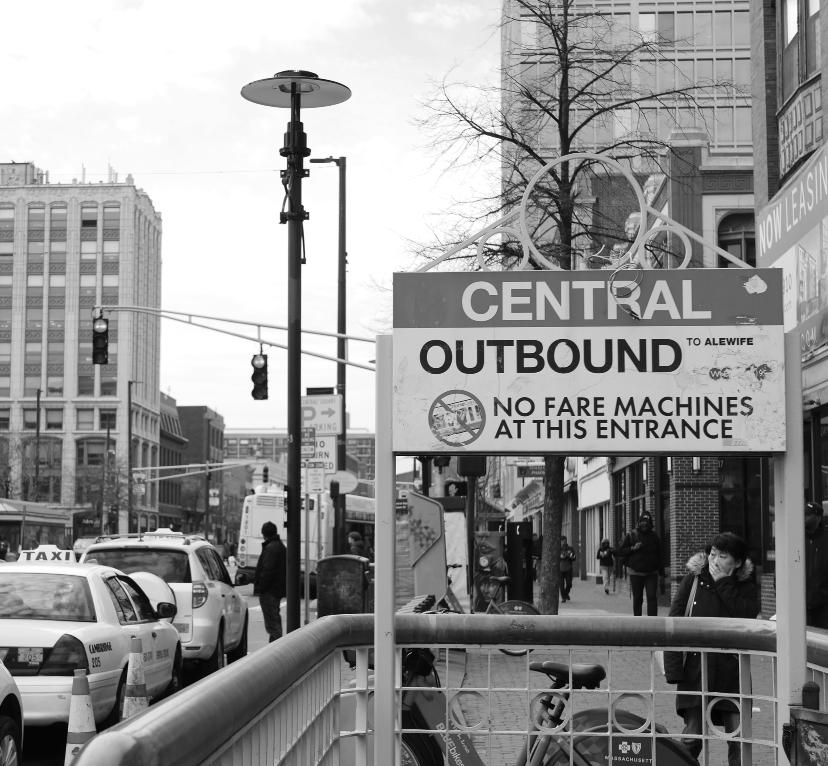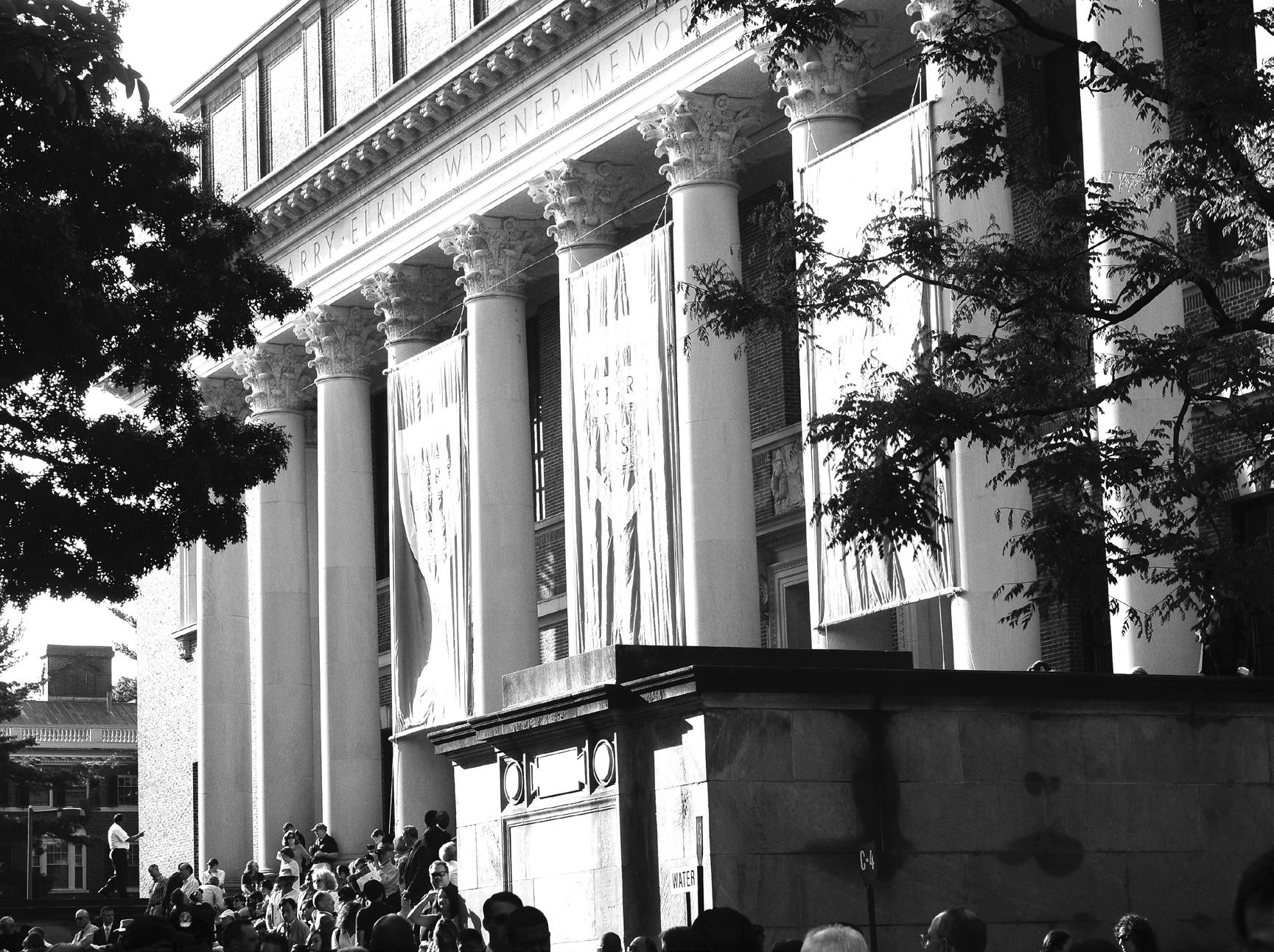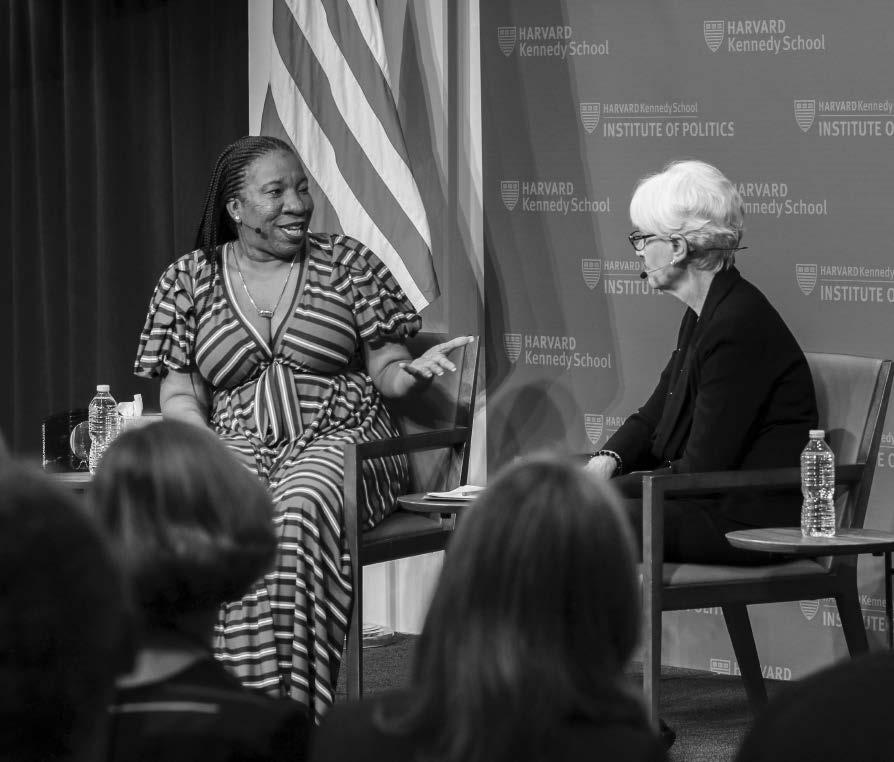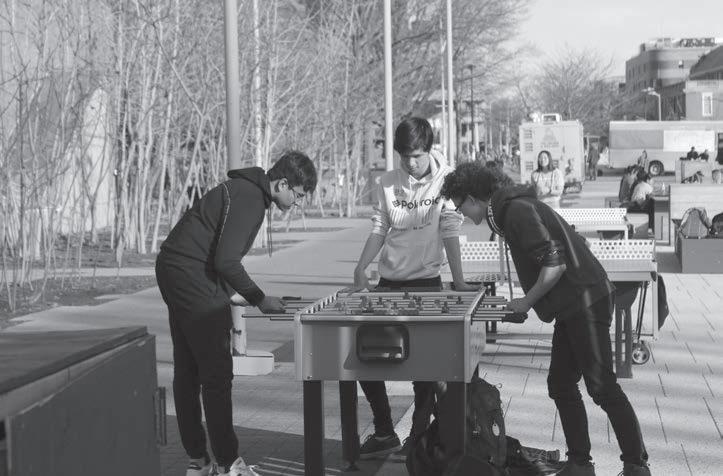
18 minute read
Editorial
The Crimson Edi orial board
Last week, Harvard announced that Martin “Marty” Baron, cur rent executive editor of the Washington Post and the former executive editor of the Boston Globe, will be the Class of 2020’s commencement speaker. Over his more than 40-year career, teams of reporters under Baron’s leadership have been awarded 16 Pulitzer Prizes and bro ken stories that shook up not just Boston and the United States, but the world at large. Baron ran the Globe when the pa per’s “Spotlight” team unearthed a widespread practice of sexual abuse by priests across Roman Catholic communities in the Boston area. Also under Baron’s guidance, the Post uncovered and pub lished the Afghanistan papers, exposing malpractice by U.S government officials as they conducted military operations in the Middle East. These journalistic feats speak to the impact of the free press, and to the power that in-depth investi gative journalism can have on our lives. Further, they speak to Baron’s own un wavering commitment to speaking truth to power and doing so with care and re spect. There is a strong case to be made for Baron’s work representing the best of what journalism ought to look like.
At the same time, Baron’s journalism career, while overwhelmingly bright, has not been spotless. Just this January, Bar on was at the center of a controversy over the Post’s decision to suspend a reporter who used her personal Twitter account to retweet an article about the late Kobe Bryant’s 2003 sexual assault case on the day of the famed athlete’s passing. The decision, which was later reversed, has been criticized in the Post itself. This in cident should serve to remind us all that, while the functions of a free press are in dispensable, trying to embody journalistic excellence is a never-ending task, and that even the greats are continually test ed (and occasionally fail) at this task. The production of good journalism requires constant humility, scrutiny, and ethical vigilance. Continuous striving for a more equitable, representative culture in jour nalism is a critical part of that task. Baron’s storied career serves to capture the struggles, triumphs, and ultimately the necessity of an industry currently under attack.
Harvard’s selection of Baron as this year’s commencement speaker is an en couraging acknowledgment of the crucial role that journalism plays in any free society. The Globe’s investigation into the Catholic Church and release of the Afghanistan papers are just a few of many instances where Baron, his news papers, and the press have been able to check institutions of power and hold au thorities accountable for their actions. Such work shifts our perceptions of the truth and enhances the richness with which we understand reality. We would be remiss not to praise it.
We also appreciate the way in which Harvard’s choice of Baron pushes against our general idea of what an ide al commencement speaker is. Investigative journalism isn’t the ritziest business. While most Harvard students expect and might covet the selection of someone whose name is universally known, Har vard’s choice of Baron — a name arguably less recognizable than last year’s com mencement speaker, Angela Merkel — elevates journalists and their work to an important level parallel to the star-stud ded list of past commencement speakers such as Bill Gates and Oprah Winfrey.
We are excited to hear the perspec tive that Baron has to share with Harvard’s graduating class. Baron’s Selection Highlights the Necessity — and the Challenges — of Good Journalism
This staff editorial solely represents the majority view of The Crimson Editorial Board. It is the product of discussions at regular Editorial Board meetings. In order to ensure the impartiality of our journal ism, Crimson editors who choose to opine and vote at these meetings are not involved in the reporting of articles on similar top ics. There is a strong case to be made for Baron’s work representing the best of what journalism ought to look like.
Submit an Op-Ed Today!
The Crimson @thecrimson
The Trump Bucket: The Perils of Being Conservative at Harvard Op-ed
By Carine M. Hajjar
As a non-liberal student on Harvard’s campus, I’ve always had an instinct to stay quiet about my beliefs. I could nev er pin down why, though. Sure, there is the sheer fact that only 10.3 percent of students in the class of 2023 consider themselves to be somewhat conserva tive (while 2.1 percent call themselves very conservative). Overall, however, I’ve usually been able to override my in stinct to remain subdued. Recently, I was able to pin down a reason. While talking to a peer about her work with a conser vative woman on campus — a moderate, at that — I asked her if she was conserva tive herself.
She looked as though I had uncovered her deepest secret. Her eyes bulged and she stuttered. My first impression was that she was nervous to admit her con servatism; however, after reflecting, I’m almost positive that her apprehension was due to the common association of conservatism with Trumpism at Har vard.
The fear of being associated with Trump and the current Republican Par ty stifles conversations between liberal and conservative students while simul taneously delegitimizing conservative students’ beliefs. Going forward, both groups must take steps to create a pro ductive, respectful dialogue. Moreover, liberals must correct their understand ing of conservative views, and conservatives must overcome their fear of being labeled as supporters of a widely unpop ular president among Harvard students. Liberal students must take steps to differentiate Trumpism from conserva tism. While some conservative students do support the president, my bet is that most on this campus do not (though if they do, their reasons for doing so may be surprising and acceptable to liber als upon open dialogue). Here is why: The president does not govern conser vatively. The Trump administration has “hijacked” a traditionally conservative party and imposed on it a mix of popu list assertions. As the GOP undergoes an identity crisis, a huge contingent of the party is finding itself politically dis placed.
There are a few key distinctions be tween today’s party and the current administration. Conservatism does not entail an overall rejection of change, but is a moderated and controlled attitude to wards change that asserts that when the government tries to resolve one issue, it usually creates more. Yet while many conservatives celebrate free trade, lit tle government involvement, and consequently less spending, this administration has pursued heightened protectionism and huge amounts of government spending and expansion. Of course, it is hard to define conservatives as a whole over space and time, but what I can say with confidence is that just ten years ago, the Trump platform would not have sur vived a Republican primary.
With a better understanding of gen eral conservative principles, liberal students may start to see conservatism as a distinct political philosophy and dif ferentiate it from the surge of populism that they so harshly condemn. In the same vein, liberal students should also consider engaging Trump supporters in conversation to understand their stand points — some of which will certainly be reasonable. In this way, they can leave the echo chambers that condemn and misconstrue the conservative ideology. Understanding leads to the type of dia logue that can heal the divides between ideologically opposed students on this campus. While liberal students need to educate themselves and open the dia logue to all views, conservatives need to step up and stand by their opinions. Only then can they destigmatize their beliefs on campus.
Conservative students’ fear is under standable, however. The automatic association between President Trump and conservatism is not just deeply flawed, but it can even be dangerous for non-liberal students. The President is broadly perceived as an unintelligent, even ma licious, individual in most circles on this campus. Take a moment and think about what your reaction would be if you were falsely accused of voting for President Trump and thus associated with those traits. Surely you would do everything in your power to dismiss the accusation. Perhaps you would avoid even bringing up topics that could lead to this conver sation.
But even if I, and other non-liberals, fear speaking up, we cannot afford to stay quiet if we hope to engage in comprehen
sive, inclusive conversations on campus. For instance, I have made it a point to engage my liberal friends in more po litical conversations. This is always an anxiety-inducing experience at the be ginning. In a short amount of time, however, the majority of my peers are surprised by the legitimacy of my opinions and my lack of maliciousness and igno rance.Going into the 2020 elections, it is now more imperative than ever that lib eral students overcome their false associations by listening with an open mind and educating themselves about actual conservatism.
At the same time, conservative stu dents also have a job to do: Instead of fearing what others think of them, they must clearly articulate their beliefs in or der to distinguish themselves from the false caricatures that have become the defaults in so many of their peers’ minds.
olumn
Life, Liberty, and Basic Income Matthew B. Gilbert A Ti e for New Ideas
“W e hold these truths to be self-evident, that all men are created equal, that they are endowed by their Cre ator with certain unalienable Rights, that among these are Life, Liberty and the pursuit of Happi ness.”
The Founding Fathers penned these words in the Declaration of Independence and laid forth a vision of what America could be. There is hope in these words — hope for a world in which all peo ple have their basic needs met, have the freedom to make their own choices, and have the oppor tunity to pursue a meaningful life in their own way. We have not yet met this vision, but I believe that we have both the ability to achieve it and a moral obligation to do so. We need universal ba sic income in order to guarantee these rights to
all Americans.
UBI advocate Scott Santens has noted that “Poverty is a legal status … Poverty is being legally excluded from having sufficient access to resourc es to exist.” The existence of poverty is an unnatural violation of people’s right to life. It should not exist and it does not have to. In the United States today there is enough food for people to eat and there are enough beds for people to sleep in. The issue is that basic needs like these cost money. Survival costs money. As a society, we have decid ed that those without money should not survive — but we can change that. We have a moral duty to change that. Not only do humans deserve, as a right, the basic necessities of survival, but fur thermore, nobody has the right to come between a person and what they need to survive. A univer sal basic income can eliminate poverty entirely by giving people the ability to acquire their basic ne cessities and ensure the right to life for all Americans.
But survival is not enough; someone in prison has their basic needs taken care of, but that life is not enviable. People also have a right to liber ty, defined here as freedom from coercion. In other words, it is the ability to say no. The choice between work and starvation is not a choice at all. That is not freedom.
We have decided to structure our society such that most people have no choice but to sell their la bor in order to survive. When a person’s life rests in the hands of their employer, they are not free. While we have many protections for workers, we have not abolished this one-sided relationship and the unjust coercive power that comes with it. UBI liberates people from financial dependence on others in every kind of relationship: freedom from exploitative work, abusive partners, and more.
Critics of UBI claim that it would reduce peo ple’s desire to work, but that very criticism reveals that much opposition to UBI comes from those who stand to lose their coercive power over oth ers. If someone would quit a job once their basic needs were met, they were only working that job to meet their basic needs — to survive. Therefore, they were coerced into the job by the threat of poverty and did not take the job by their own free will. UBI gives people the chance to be truly free. What will people do with their newfound free dom? Anything they want. Many people will keep their jobs; people often enjoy the structure, com munity, purpose, or extra income that comes with a job. Some, once they receive the financial secu rity of UBI, will still work, but will quit their second or third job or limit their hours in order to do more of whatever they enjoy. Others will stop working entirely because those jobs are danger ous, exploitative, or otherwise unpleasant, as they should have the right to do.
This reduction of work should be celebrat ed; our society can function perfectly well without much of the work that people are forced into today. Many people will then have more time to pursue the activities they find most meaningful. UBI recipients will spend more time with their kids and families. They will care for elderly and sick relatives. They will volunteer and start busi nesses. They will become artists and writers, journalists and students, dreamers and doers. We waste untold potential and systematically crush the human spirit because we force people into needless drudgery just to stay alive. We deny an integral part of the human experience by deny ing people the chance to create, to explore, and to pursue happiness.
Critics have disparaged UBI as “free mon ey” or a gimmick. What they fail to realize is that money is not the point of UBI. Money is a means to an end: freedom. Freedom from poverty, freedom from coercion, and freedom to strive for self-ac tualization.
Basic income is not charity or welfare. It is a right. We have both the ability and the obliga tion to end poverty, ensure liberty, and give every American the chance to find their own version of success. We can finally live up to the ideals of the Declaration of Independence and secure these natural rights. There is no reason to wait. The time for universal basic income is now.
Cambridge will now be allowing people to apply for marijuana dispensary licenses after a long legal fight.sara komatsu—Crimson photographer

History Professor Hinton Departs Harvard for Yale hinton From Page 1
I think is really important in terms of the moment that we’re in right now in confronting is sues of racism in the criminal justice system, and considering new pathways for reform,” Hin ton said.
“Yale provides me a new kind of platform and I think an important one for my scholar ship moving forward,” she added.
Hinton will also join Yale’s Justice Collaboratory, which brings together scholars from a variety of fields to study crimi nal justice reform.
Though Hinton’s departure comes amid increased scrutiny of Harvard’s tenure processes — particularly of its retention and promotion of faculty who study race and ethnicity — Hinton said that recent controversies did not affect her decision, giv en that she had received tenure at both institutions.
“Tenure was not a part of my decision,” Hinton said, adding that recent ethnic studies advo cacy likewise played no role in her move.
Heather K. Gerken Dean of Yale Law School
Hinton said she was a “tar get of opportunity hire,” meaning Yale created a position for her specifically rather than con ducting a broad-based faculty search.
“The Law School had ex pressed interest in hiring me and that’s what led to the cre ation of my position,” she said. FAS spokesperson Anna G. Cowenhoven declined to com ment on Hinton’s departure.
Gerken wrote in an email to The Crimson that she is looking forward to welcoming Hinton to the ranks of Yale Law’s fac ulty.
“Yale Law School has a re markable group of legal historians and scholars of criminal justice as well as the Justice Collaboratory, which is a magnet for academics across the University,” Gerken wrote. “Professor Hinton is one of the finest historians of her genera tion, and her work is deeply connected to our faculty’s.”
“We could not be happier that she will be joining our in tellectual community,” Gerken added.
james.bikales@thecrimson.com
Cambridge Revises Position on Dispensaries
By Maria g. gonzalez Crimson Staff Writer
Cambridge will now accept and process bids for recreational cannabis businesses after a Su perior Court judge ruled the city must do so, according to a Feb. 20 announcement.
The Cambridge solicitor’s office filed a motion last week appealing a Middlesex Superi or Court decision which ruled Cambridge’s marijuana mora torium illegal.
The moratorium — which gave “economic empowerment applicants” a two-year headstart in recreational marijuana sales — violated the the home rule amendment to the Massa chusetts state constitution, the judge ruled.
Cambridge defined econom ic empowerment applicants as businesses run by people who have been disproportionately harmed by past marijuana laws. During a city council meet ing in June, Sumbul Siddiqui — who now serves as Cambridge’s mayor — spoke about the need for the two-year economic em powerment amendment.
“The country’s racist war on drugs has heavily impacted and criminalized black and brown folks,” Siddiqui said.
“It’s our collective respon sibility to do the best we can to fight [for] policies that provide equitable access to the wealth and opportunity inherent in this emerging billion dollar cannabis industry.”
Though a Feb. 14 statement said Cambridge would await further action by either the Su perior Court or the Appeals Court before agreeing to new contracts with recreational pot companies, the city has revised its original position.
Cambridge will now accept all applications for “host com munity agreements” from interested parties.
The city will also enter into HCAs with qualifying appli cants, according to the revised announcement.
In order to obtain an HCA in Cambridge, businesses must submit a statement of interest to the city.
Applicants may also be asked to present their informa tion in person so city staff can ask them further questions.
According to city guidelines, a statement of interest consists of a cover letter, a special per mit from the Cambridge planning board, a cannabis business permit, a management and op erations profile, and qualifying documentation.
Moreover, applicants must submit a plan for “positive com munity impact” and certification, which mandates that a majority of the applicant’s employees will be minorities, women, or military veterans.
Certification guidelines also encourage businesses to hire Cambridge residents.
Finally, if the application is approved, the business must hold semi-annual community outreach meetings.
maria.gonzalez@thecrimson.com
Public Health Students Host Painting Self-Care Night
By hannah j. Martinez and jacavian d. voss Contributing Writers
Roughly 30 students from the Harvard School of Public Health gathered at the Longwood cam pus for a night of painting in a bid to give students a mental health break Wednesday evening.
Sarah E. Zelasky, vice presi dent of student life for the Harvard Chan Student Association, said she helped organize the event “hoping to not only have students have like a men tal health break from their studies, but to also form some friendships while they’re here.”
“Our school focuses a lot on academia, and that we also are a community, and it’s really im portant for us to remember that and provide more opportunities for people to hang out and get to gether,” said Zelasky.
Sina Famenini, vice pres ident of student advocacy for the HCSA, said he believes this event is especially important during the winter. “Winter is isolating and the days are short and people are in side all day, so if we have to be inside, we might as well bring people together for a fun event addressing mental health and loneliness through art,” Fame nini said.
Sina Famenini Vice President of Student Advocacy for HSCA
Caroline D. Keroack, a Ph.D. candidate at the Graduate School of Arts and Sciences, guided the participants through painting the Boston skyline, but encour aged them to paint whatever they wished. She said the event attempted to provide a welcome break from an otherwise stress ful school environment. “It’s very hard, in like an ac ademic world, where there’s a right answer and a wrong an swer, and sort of with painting there’s no right answer and wrong answer,” Keroack said. “I’m hoping that it gives them a break from whatever home work, classes, or exams. When I paint, afterwards I feel much lighter.”
The event was HCSA’s first planned mental health break for the student body at the School of Public Health.
Hui Fen “Rachel” Lim, who participated in the art self-care night, said that she “had never really assessed” available men tal health services.
“I wish we had more events like this,” Lim said.
According to Zelasky, the event and the waitlist had been completely filled, showing the demand for events like these.
“It’s a good way to de-stress and kind of do something that you don’t normally get to do,” Archna A. Patel, who attended the event, said.
Never miss a moment.





